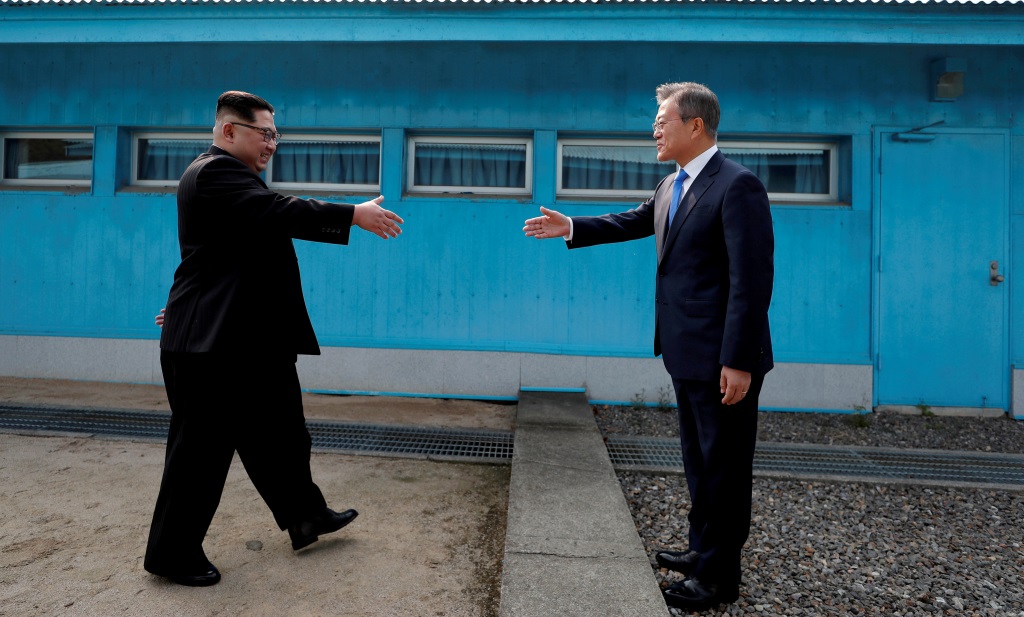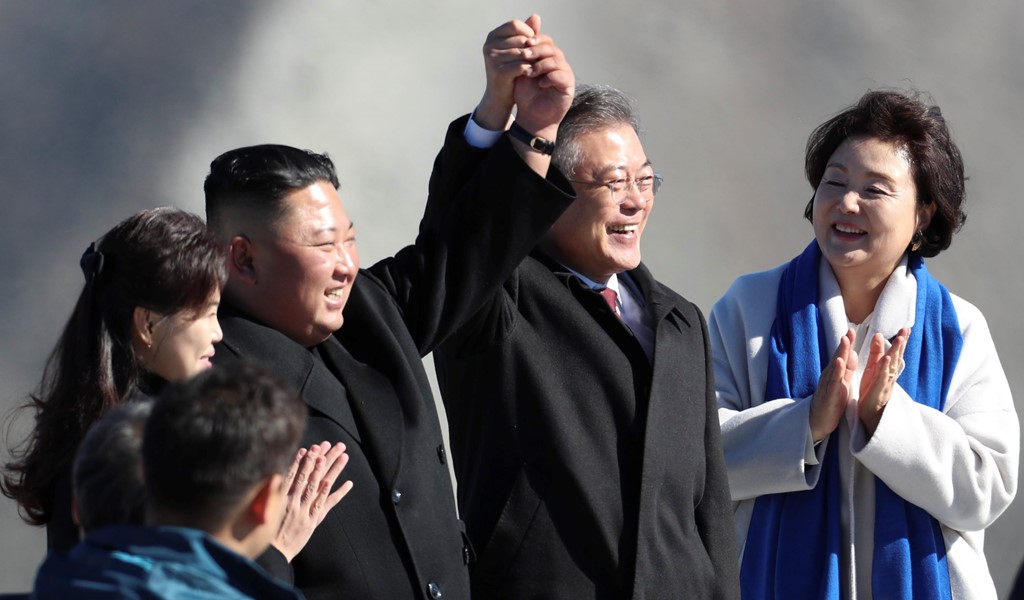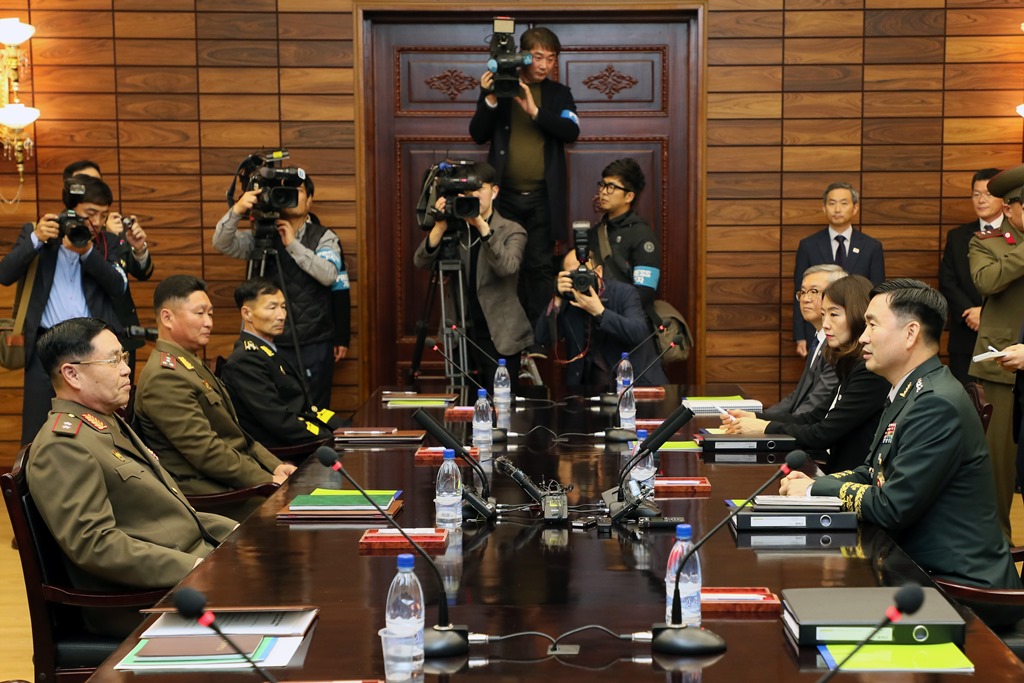Perspectives on President Moon’s Inter-Korean Policy

Launched at the end of 2017, Moon’s efforts, in conjunction with the North’s diplomatic offensive, brought the largest change in inter-Korean relations in a decade. The establishment of a political dialogue with North Korea at the highest level, topped by three meetings of the North and South Korean leaders, has led to the alleviation of tensions on the peninsula. Tangible evidence of this is in the introduction of confidence-building measures between the Korean states and the initiation of the U.S.–North Korea dialogue on denuclearisation. It has also given Moon a record of public support in comparison with previous democratically elected presidents (the president was polling about 70% after the inter-Korean summit in September last year). However, with growing internal problems in South Korea in recent months, that support has clearly decreased—in January, it was 45%.
Policy Assumptions
Inter-Korean relations are crucial for Moon’s administration. The main assumptions are establishing a lasting peace on the peninsula, the peaceful resolution of the nuclear problem, and stable, balanced development of bilateral relations, including economic cooperation. These objectives are to be achieved as part of a step-by-step approach, the simultaneous application of pressure and dialogue to solve the nuclear problem, and giving the dialogue a lasting, bipartisan character. Moon’s guiding principle has been to keep both Koreas involved in the process of achieving reconciliation and peace on the peninsula, along with openness to international cooperation.
Whether there is a permanent change in inter-Korean relations, which Moon considers his political heritage, will depend on North Korean leader Kim Jong-un’s consent to verifiable denuclearisation, U.S.–North Korea relations, and evolution of the alliance between the U.S. and South Korea. No less important will be the level of public support for Moon’s party and government. Therefore, apart from the international conditions, resolving domestic affairs, especially economic ones, will be crucial.
Problems in Cooperation with North Korea
A serious limitation of the inter-Korean dialogue is the inability to conduct economic cooperation because of strict sanctions imposed on North Korea by the UN Security Council (UNSC). The forms of cooperation authorised by the UNSC—modernisation of the railway and road connections between the two countries— does not go beyond preparatory studies and consultations. The sanctions also make it impossible to return to the most advanced form of economic cooperation involving the Kaesong industrial complex and the Mount Kumgang tourist resort.
The abolition of sanctions will not be possible without “concrete steps” by the North toward denuclearisation, a condition set by the U.S. This is a problem for the South Korean president. He is aware that Kim’s actions depend on the dialogue with the U.S. That is why Moon strives for President Donald Trump’s administration to have the most conciliatory attitude possible. The South’s president assumes North Korea is amenable to denuclearisation but only if the U.S. grants certain concessions, such as the relaxation of sanctions and security guarantees that effectively end the state of war and create a “peace mechanism” on the Korean Peninsula.
South Korea’s Domestic Challenges
Although the idea of the inter-Korean dialogue enjoys high public support in the South, socio-economic issues are of primary importance to voters. The fall in support for Moon in recent months is the result of dissatisfaction with the lack of solutions in these areas. The most serious challenges are the situation on the labour market (especially among young people, where unemployment is about 10% compared to 4.5% among the general population), problems related to the ageing of society, and need for greater economic growth. Responding to these problems will be crucial to maintaining sufficient support and a victory for Moon’s Democratic Party in the parliamentary elections in 2020. Without strong backing in parliament, Moon will have limited possibilities to achieve his administration’s policy objectives regarding North Korea before the end of his term in 2022. Improvement of the economic situation has been the main topic in Moon’s public statements since the beginning of the year. As well, the inter-Korean dialogue has been presented primarily through the prism of potential economic benefits.
Despite last year’s success, Moon has failed to build bipartisan support for the inter-Korean policy. While the president is benefitting from the weakness of the opposition conservatives after the impeachment of President Park Geun-hye, in the long term they are likely to strengthen. Wider political backing for the political dialogue with North Korea is necessary for successive South Korean administrations—no matter the party—to be able to sustain policies related to inter-Korean relations.
Impact of South Korea-U.S. Relations
Although Moon emphasizes the need for denuclearisation, this matter less important to him than to the Trump administration. Moon underlines that the nuclear problem requires bilateral concessions from the U.S. and North Korea. He expects the U.S. authorities to ease sanctions on the North, which would be beneficial for the inter-Korean dialogue. Moon wants to make inter-Korean politics as independent as possible from progress on the nuclear issue. Disputes with the Trump administration that have arisen in recent months are problematic for him. These include the U.S. insistence on re-negotiation of the free trade agreement or demand for a new agreement on sharing the cost of stationing American troops in South Korea, which was concluded for only one year and not, as before, for five years, which limits the predictability of military cooperation with the U.S.
Conclusions and Perspectives
Without improvements in economic results, Moon will lose public support, depriving him of the political capital to continue inter-Korean reconciliation, which in effect would weaken the dynamics of the relations between the two Koreas. It would worsen the situation on the peninsula. The inter-Korean dialogue is all the more important because the fate of U.S.–North Korea talks on denuclearisation is uncertain.
The inter-Korean dialogue and Moon’s policy are supported by the EU and the Member States. However, the EU’s attitude toward North Korea is reactive and depends on the state of the U.S.–North Korea nuclear dialogue. This is evident in European support for sanctions and by European leaders’ statements during Moon’s visit to Europe in October last year when he unsuccessfully sought to ease sanctions on the North.
It is in the EU’s interest to further stabilise the situation on the Korean Peninsula, including reducing the likelihood of conflict and the risk of WMD proliferation. For this reason, the EU should equally support dialogue on gradual denuclearisation and Korean reconciliation as a tool for building a lasting peace. It should be guided by the assumption that stability on the peninsula cannot be established solely by pressure and sanctions. While in an earlier stage they proved to be effective as a way to get North Korea to talk, keeping them in place longer increases the risk of hardening the North’s negotiating position. From this point of view, there may be more support than usual for Moon’s conciliatory actions, treating them as just as important an element of stability-building on the Peninsula as the U.S.–North Korea dialogue. The EU and the Member States could look into the possibility of easing their own sanctions on the North and intensifying discussions on the relaxation of the UN sanctions in order to support the inter-Korean reconciliation process (e.g., by requesting a waiver for the opening of the Kaesong industrial complex). Maintaining a waiting attitude and making moves dependent on the progress of negotiations on denuclearisation threatens to further marginalise the EU’s role in influencing the security issues on the peninsula.





